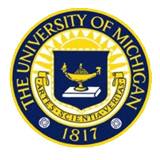I³ Building Bridges, Creating Community and Wise Mentoring: Building Institutional Capacity to Enhance Diversity in STEM Disciplines
PROJECT OVERVIEW:
The project proposed here integrates existing University of Michigan activities to increase participation of underrepresented minority students in STEM fields in three ways: (1) by attracting a new group of underrepresented minority students to doctoral education in biology, math and physics via master’s degree programs; (2) by enhancing and strengthening the intergenerational community among underrepresented minority scientists and engineers at all student and faculty levels of the University: (3) by strengthening the capacity of all faculty members to provide effective mentoring to students who come from educational and cultural backgrounds different from their own.
Diversity in the STEM disciplines has only begun to reflect the diversity of the U.S. population. We believe it is urgent to encourage more of the nation’s talented underrepresented minority undergraduates to pursue scientific doctorates by engaging them in research master’s programs that will provide full funding and strong preparation for doctoral programs. The traditional path of moving students directly from undergraduate study to doctoral education has not accomplished the goal of increasing diversity in STEM, and may even be counterproductive. Some evidence suggests that underrepresented minority students are more likely than other students to pursue master’s degrees before committing to doctoral education.
Our proposed master’s programs aim particularly at attracting students in fields (ecology and evolutionary biology, mathematics and physics) where other efforts to diversify doctoral programs have been relatively unsuccessful. The master’s programs are thoughtfully designed to incorporate scientific rigor and active learning innovations. However, by themselves they are unlikely to be successful; our plans call for active contributions of key institutional partners. We will recruit and support students via a strong intergenerational community of underrepresented minority faculty and students at all levels in the University. To surround master’s students with an intergenerational community we will take advantage of many existing programs currently aimed at either undergraduate or doctoral students. The master’s students will also be supported in creating their own community within and across programs. We will develop the faculty to offer focused, competent and intentional mentoring. Strong and effective faculty mentoring will encourage these students to pursue doctoral education, and simultaneously will increase the campus capacity for excellent mentoring of underrepresented minority students at all levels. This program, then, will integrate our NSF-funded and UM-funded efforts to recruit and support URM students at all levels of science education.
Intellectual Merit: Our proposal is based on solid social science evidence about the support structures that predict the academic success of students from underrepresented groups. Moreover, it creates strong links between research excellence and successful educational outcomes for both students and faculty mentors, through deep ties across academic generations in research groups and faculty mentoring teams. It leverages existing federally-funded and university-supported resources (all of which have been carefully evaluated) to enhance underrepresented minority students’ seamless transitions and ultimate success in academic science careers.
Broader Impact: By increasing the participation of underrepresented minorities in selected STEM fields, we seek to have a broader impact by attracting new students into doctoral education, and by providing URM students at all levels of university education with intergenerational community and wise mentoring. If successful, we will provide a new model of graduate education for URM students that can be shared across the STEM disciplines and disseminated to other research universities. Our successful students, as they complete master’s degrees and doctorates, will become mentors in their own right, and will generate “positive feedback” in the education system, moving the scientific workforce towards equitable representation by underrepresented minority groups.
Dates:
Start: September 15, 2010End: August 31, 2015
Project Members:
Institution:
University of Michigan Ann ArborProject Website:
Frontiers Program
AIM Program
Applied Physics


